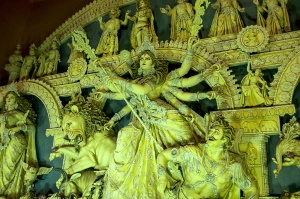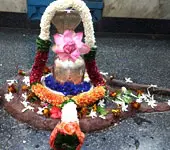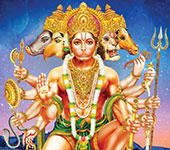Do you know why Hanumanji is the favorite of Lord Rama?
Comments
Which head of Lord Shiva did Renukacharya originate from?
Sadyojata.
Gemstone for Ashwini Nakshatra
Cat's eye
Quiz
Which is the planet connected with Vamanavatara ?Recommended for you
Tatvamasi in Srividya mantra

Learn how the Vedantic mahavakya तत्त्वमसि is contained in and realized through the sadhana of the Srividya Panchadashakshari mantra....
Click here to know more..Mantra For Hundred Years Of Happy And Healthy Living

पश्येम शरदः शतम् ॥१॥ जीवेम शरदः शतम् ॥२॥ बुध्येम शरदः शत�....
Click here to know more..Ardhanareeshwara Namaskara Stotram

shreekant'ham paramodaaram sadaaraadhyaam himaadrijaam| namasyaamyardhanaareesham paarvateemambikaam tathaa| shoolinam bhairavam rudram shoolineem var....
Click here to know more..
English Topics
Hanuman
Click on any topic to open
- 40 Hanumanji Prevented From Serving Sri Ramji
- 39 Why Did Hanumanji Tear Open His Own Chest?
- 38 Hanumanji Turns Devi Against Ravana
- 37 Hanumanji Meets His Son
- 36 Hanumanji Gets Dronagiri To Lanka
- 35 How Lakshmana Was Injured In The Battlefield
- 34 Ravana gets an idea of the power of Lord Rama
- 33 Did the vanara sena actually cross through the bridge?
- 32 Bhakti and seva of a squirrel
- 31 Vibhishana takes refuge in Lord Rama
Please wait while the audio list loads..
30
Ganapathy
Shiva
Hanuman
Devi
Vishnu Sahasranama
Mahabharatam
Practical Wisdom
Yoga Vasishta
Vedas
Rituals
Rare Topics
Devi Mahatmyam
Glory of Venkatesha
Shani Mahatmya
Story of Sri Yantra
Rudram Explained
Atharva Sheersha
Sri Suktam
Kathopanishad
Ramayana
Mystique
Mantra Shastra
Bharat Matha
Bhagavatam
Astrology
Temples
Spiritual books
Purana Stories
Festivals
Sages and Saints
